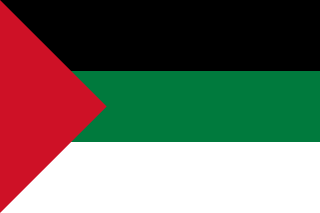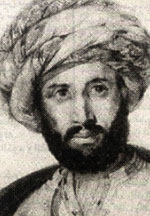Related Research Articles

The Society of the Muslim Brothers, better known as the Muslim Brotherhood, is a transnational Sunni Islamist organization founded in Egypt by Islamic scholar and schoolteacher Hassan al-Banna in 1928. The organization gained supporters throughout the Arab world and influenced other Islamist groups such as Hamas with its "model of political activism combined with Islamic charity work", and in 2012 sponsored the elected political party in Egypt after the January Revolution in 2011. However, it faced periodic government crackdowns for alleged terrorist activities, and as of 2015 is considered a terrorist organization by the governments of Bahrain, Egypt, Russia, Syria, Saudi Arabia and the United Arab Emirates.
Roger Garaudy, later Ragaa Garaudy was a French philosopher, French resistance fighter and a prominent communist author. He converted to Islam in 1982. In 1998, he was prosecuted for Holocaust denial under French law for claiming that the death of six million Jews was a "myth."

Western Asia, West Asia, Southwestern Asia or Southwest Asia is the westernmost subregion of Asia. The concept is in limited use, as it significantly overlaps with the Middle East, the main difference usually being the exclusion of the majority of Egypt and the inclusion of the Caucasus. The term is sometimes used for the purposes of grouping countries in statistics. The total population of Western Asia is an estimated 300 million as of 2015. Although the term "Western Asia" is mostly used as a convenient division of contemporary sovereign states into a manageable number of world regions for statistical purposes, it is sometimes used instead of the more geopolitical term "Middle East".

The flag of Egypt is a tricolour consisting of the three equal horizontal red, white, and black bands of the Egyptian revolutionary flag dating back to the 1952 Egyptian Revolution. The flag bears Egypt's national emblem, the Egyptian eagle of Saladin centered in the white band.

The Pan-Arab colors are black, white, green, and red. Individually, each of the four Pan-Arab colors were intended to represent a certain Arab dynasty, or era. The black was the Abbasid dynastic color; white was the Umayyad dynastic color; green was the Fatimid dynastic color; and red was the Hashemite dynastic color and also represented the Ottoman Empire. The four colors derived their potency from a verse by 14th century Iraqi poet Safi Al-Din Al-Hilli: "White are our acts, black our battles, green our fields, and red our swords".

Muḥammad 'Abduh was an Egyptian Islamic jurist, religious scholar and liberal reformer, regarded as one of the key founding figures of Islamic Modernism, sometimes called Neo-Mu’tazilism after the medieval Islamic school of theology based on rationalism, Muʿtazila. He also wrote, among other things, "Treatise on the Oneness of God", and a commentary on the Qur'an.
The European Council for Fatwa and Research (ECFR) is a Dublin-based private foundation, founded in London on 29–30 March 1997 on the initiative of the Federation of Islamic Organizations in Europe. The Council is a largely self-selected body, composed of Islamic clerics and scholars, presided over by Yusuf al-Qaradawi.

The Federation of Arab Republics was an attempt by Muammar Gaddafi to merge Libya, Egypt and Syria in order to create a United Arab state. Although approved by a referendum in each country on 1 September 1971, the three countries disagreed on the specific terms of the merger. The federation lasted from 1 January 1972 to 19 November 1977.
Islam and modernity is a topic of discussion in contemporary sociology of religion. The history of Islam chronicles different interpretations and approaches. Modernity is a complex and multidimensional phenomenon rather than a unified and coherent one. It has historically had different schools of thought moving in many directions.

The Islamic Cultural Centre of Ireland is an Islamic complex, including a mosque, in Clonskeagh, Dublin, Ireland. It is funded by the al-Maktoum Foundation of Dubai and has a Sunni orientation.

Rifa'a al-Tahtawi was an Egyptian writer, teacher, translator, Egyptologist and renaissance intellectual. Tahtawi was among the first Egyptian scholars to write about Western cultures in an attempt to bring about a reconciliation and an understanding between Islamic and Christian civilizations. He founded the School of Languages in 1835 and was influential in the development of science, law, literature and Egyptology in 19th-century Egypt. His work influenced that of many later scholars including Muhammad Abduh.
Abdirizak Waberi is a Somali-Swedish Moderate Party politician. He was a member of the Swedish parliament from the 2010 election until the next election in 2014, representing the Gothenburg Municipality constituency.
FIOE may refer to:

Pan-Arabism, or simply Arabism, is an ideology espousing the unification of the countries of North Africa and West Asia from the Atlantic Ocean to the Arabian Sea, referred to as the Arab world. It is closely connected to Arab nationalism, which asserts that the Arabs constitute a single nation. Its popularity was at its height during the 1950s and 1960s. Advocates of pan-Arabism have often espoused socialist principles and strongly opposed Western political involvement in the Arab world. It also sought to empower Arab states against outside forces by forming alliances and – to a lesser extent – economic co-operation.
The Europe Trust, formerly known as the European Trust, is a UK charity and company which lists its purpose as developing a portfolio of assets intended to fund social and economic projects for communities in Europe. The Europe Trust was founded by the Federation of Islamic Organizations in Europe (FIOE), an organization alleged to have ties with the Muslim Brotherhood in Europe.
In March 2014, British Prime Minister David Cameron asked the then British Ambassador to Saudi Arabia, Sir John Jenkins, to lead a government review into the Muslim Brotherhood.
The Islamic Cultural Center Sesto San Giovanni was established in Sesto San Giovanni, a commune in the Metropolitan City of Milan, Lombardy, northern Italy. The center’s main goal is to serve the needs of the local Muslim community by contributing to the education of the Muslim citizen, by engaging the youth and by promoting intercultural dialogue. The Islamic Cultural Center Sesto San Giovanni is actively promoting the construction of a new mosque.

Omar Mustafa is a Swedish politician and leader of the Islamic organisation in Sweden. He was a politician for the Social Democrat Party for AStockholm between 7 and 13 May 2014.

The Ahmadiyya is an Islamic movement in Egypt with origins in the Indian subcontinent. Although the earliest contact between Egyptians and the Ahmadiyya movement was during the lifetime of Mirza Ghulam Ahmad, its founder, the movement in Egypt was formally established in 1922 under the leadership of its second Caliph Opposition to the Ahmadiyya grew particularly in the latter part the 20th century and Ahmadis have seen increased hostility in Egypt more recently. There are up to 50,000 Ahmadi Muslims in Egypt. Although the group is not officially recognised by the state.
References
- ↑ "Federation of Islamic Organisation in Europe". fioe.org. Retrieved 3 August 2015.